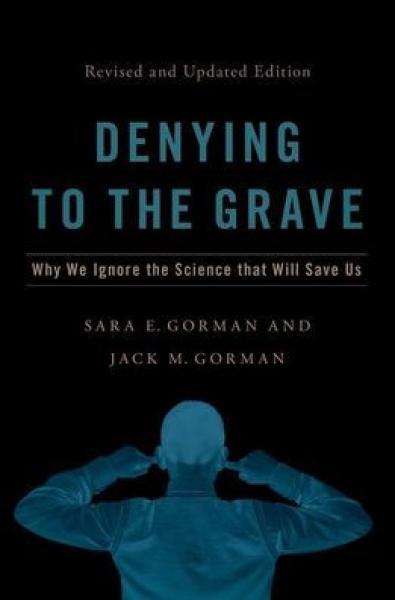Description
Why do some parents decide not to vaccinate their children? Why do some people keep guns at home, despite ample evidence that doing so increases the risk of a gun-related injury? And why do people use antibiotics for illnesses that antibiotics cannot possibly alleviate? When it comes to health, many
people believe that science is wrong, that the evidence is incomplete, and that unidentified hazards lurk everywhere.
In Denying to the Grave, Sara Gorman and Jack Gorman explore the psychology of health science denial. Using several examples as case studies, they propose six key principles that may lead people to reject "accepted" health-related wisdom: the charismatic leader; fear of complexity; confirmation
bias; fear of corporate and government conspiracies; causality and filling the ignorance gap; and the nature of risk prediction. This fully updated and expanded new edition of Denying to the Grave reviews the most recent research on health science denial, offering a brand new chapter on how the
contemporary "assault on science" waged by certain political administrations has eroded public trust in national health and science agencies, such as CDC, FDA, and EPA. Also new to this edition is a chapter investigating the relationship between health crises and misinformation, and what happens to
science denial amidst a global public health crisis. Finally, the book proposes a novel approach to counteracting misinformation and improving our ability to understand and accept scientific consensus.
In an era in which trust in science has become more important, and yet more elusive, than ever before, Denying to the Grave sheds light on why we often choose to ignore scientific evidence, pointing the way toward a new understanding of how science should be conveyed to the public in order to save
lives with existing knowledge and technology.
"This chapter addresses the complicated topic of conspiracy theories. This topic is complicated because a conspiracy theory is not prima facie wrong. Yet one of the hallmarks of false scientific beliefs is the claim by their adherents that they are the victims of profiteering, deceit, and cover-ups by conglomerates variously composed of large corporations, government regulatory agencies, the media, and professional medical societies. The trick is to figure out if the false ones can be readily separated from those in which there may be some truth. Only by carefully analyzing a number of such conspiracy theories and their adherents does it become possible to offer some guidelines as to which are most obviously incorrect. The chapter then studies the psychology of conspiracy theory adherence. It argues that belittling people who come to believe in false conspiracy theories as ignorant or mean-spirited is perhaps the surest route to reinforcing an anti-science position"--
Praise for the first edition
"In this superb book, Sara E. Gorman (project manager, Johnson & Johnson Global Public Health) and psychiatrist Jack M. Gorman (CEO & chief scientific officer, Franklin Behavioral Health; The Essential Guide to Psychiatric Drugs) collaborate to explain why many people deny scientifically established
facts, even in the face of compelling evidence...Perfect for fans of the subject and Daniel Kahneman's Thinking, Fast and Slow."--Library Journal, Starred Review
"Perhaps a new book, Denying to the Grave by public health specialists (a father and daughter team) Sara Gorman and Jack Gorman, can help us understand why facts and statistics fall on deaf ears time and time again...The book is thoughtful, exploring the psychology, neurobiology and evolutionary
roots that underpin some of our decision-making, which can make adaptive behaviour maladaptive."--New Scientist
"In [Denying to the Grave], the Gormans explain not just how people fall for the false claims of politicians, but also how intelligent people wind up in cults or why a nation wracked by gun violence continues to reject gun-control measure... [The Gormans are] equal opportunity debunkers, taking on
GMO fear-mongering and anti-vaxers along with the National Rifle Association."--The Atlantic
"Why do so many cling to beliefs that run counter to evidence? Sara Gorman, a public health expert, and Jack Gorman, a psychiatrist, investigate the psychological factors that lead to such self-defeating denial of facts and conclude that normal, evolutionarily adaptive tendencies act against
us."--Scientific American
"A thought-provoking and entertaining examination of science denial focusing on the reasons that some of us are prone to developing opinions that are not supported by science and then hold on to these opinions in the face of evidence to the contrary. The authors' use of research to back up their
arguments provides rigor while their use of anecdotes and stories makes the text more approachable. Ultimately, the marriage of these concepts, along with the lively narrative throughout the text, leads to an intriguing and timely resource during this time of political upheaval and the ensuing
challenges in civil discourse. This text is appropriate for a wide audience." --PsycCRITIQUES
Product Details
- Oxford University Press, Brand
- Jun 1, 2021 Pub Date:
- 0197547451 ISBN-10:
- 9780197547458 ISBN-13:
- 456 Pages
- 9.6 in * 6.3 in * 1.6 in Dimensions:
- 2 lb Weight:




